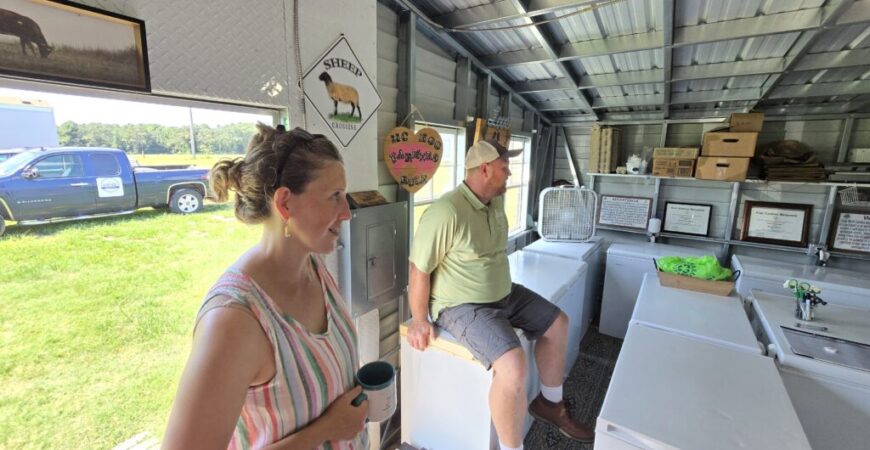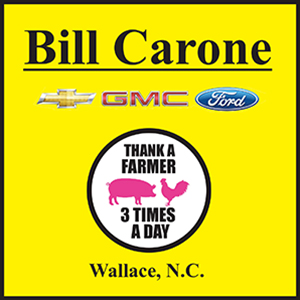Acorn Acres Farm is a dream that started on one acre of land in Faison, NC. Josh and Kim Stroud started micro farming to provide better quality food for their family. Kim was a full time teacher with a Master’s degree in Education when she decided to take time off for their children. When that time off became permanent, she started homeschooling the children and became an entrepreneur. Her business, Happy Heart Elderberry, makes a natural immune booster syrup that is sold widely in local shops and online. Meanwhile, Josh was working for a commercial pork company while also raising his own meat animals at home.
“You don’t have to have a farm to raise animals. The biggest prohibitor for people getting into farming now is the investment cost,” Josh says.
One of the ways Josh cut costs farming was with temporary poly acrylic and metal electric fencing.
“Permanent fencing costs a lot of money, but using temporary fencing and rotating your animals, you can grow a lot more on less land and with less money. It’s an easier way for people to get into farming,” he explains. “Moving the animals is also good for the soil. The animals eat the plants and fertilize it with their manure, so the grass grows more when they are moved than if they were in a pasture and never moved at all.”
Working in the commercial farm industry, Josh observed many practices that he did not agree with or practice on his own farm. The family sold their home in Faison and moved to a property with 38 acres in Mount Olive. On this little slice of rural heaven were all the seeds of what they hoped for and more: natural water, trees, nutrient-rich grasses, rolling hills, and space to grow. Growth meant a way to give back to the community with quality food products and Acorn Acres Nature School. By August 2024, Josh was able to leave commercial farming and focus full-time on regenerative farming at Acorn Acres.
Acorn Acres raises Cornish Cross chickens, heritage breed pigs, laying hens, and turkeys.
“We raise the same kind of chickens that people are used to from commercial growers; we just raise them differently,” Josh explains. All Acorn Acres animals are kept in portable pens controlled by portable electric fencing, so they are able to be moved around daily. In the summer, the pigs graze at the edge of the woods with natural shelter from the trees and mud wallows near the creek. In the winter, they move to portable shelters in the pasture. Geese help protect the birds while a donkey named Tennessee and two guard dogs get ready to protect meat sheep and cows, the farm’s next meat ventures. While a lot of meat farms have customers purchase part of an animal or become shareholders, Acorn Acres offers pre-packaged meats.
“A lot of people don’t understand where different cuts come from and get confused translating what they want with how to tell that to the butcher. We take care of all that for you. We grow it, take it to the processor, get it back, and make bundles for you to purchase what your family will want,” Josh explains. People can choose to be monthly subscribers and receive products at a 15% discount, or they can purchase products directly through the farm’s shop online, in person, or at farm events like the Clinton Farmer’s Market or Feast Downeast in Burgaw. Community Supported Agriculture members can start with packages as low as $50 a month, and they have some choice in what is included in the packages.
The Nature School provided a hands-on learning experience for children ages 5-10 to be creative and explore nature. Structured classes meet twice a week from 10 a.m. to 2 p.m. on Tuesdays and Thursdays during the school year, and Summer Camps are available once a month during the summer break.
“My Mission is to offer a high-quality education through experiential learning in God’s creation and on our farm,” Kim says. “Kids are given time to learn, explore, and play outdoors. They are encouraged and taught through child-led methods that consider the whole person: mind, body, spirit.”
Some of the kids most excited about the farm are the ones with a lot of screen time at home. “They come here and have the chance to see things and do things here that they wouldn’t normally be able to see,” Josh said. “They miss it when they are not here.”
One of the favorite spots for the kids is the Fairy Garden: an outdoor play area sheltered by trees. At the Fairy Garden, there is a mud kitchen for kids to make stuff with mud, water and foraged stuff from the land. There is also a sand pit seeded with fossils and hammocks to hang out in. During Nature School, students eat their lunch and play at the Fairy Garden. During the summer, the Stroud kids jump in a golf cart to go back to the Fairy Garden and play.
Great things are in store for Acorn Acres as it continues to grow.
In the future, they hope to host community events like Homeschool Swap Shop and outdoor movie nights on the farm. “It’s not as much about pushing products as it is about giving back to the community,” they say.
 Twitter
Twitter Facebook
Facebook Instagram
Instagram





